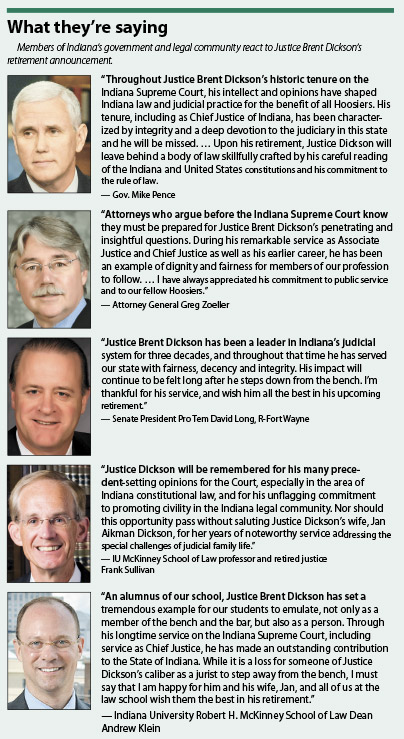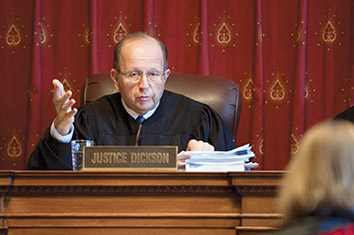Subscriber Benefit
As a subscriber you can listen to articles at work, in the car, or while you work out. Subscribe NowWhen Justice Brent Dickson arrived on the Indiana Supreme Court in 1986, it was only after colleagues urged him to apply for a position he’d never seriously considered.
“I was having a ball with my law practice and enjoying it immensely,” Dickson said. At age 44, he’d been in private practice in Lafayette for about 17 years. Some colleagues approached him at a conference about applying for a Supreme Court vacancy. He said without that nudge, he wouldn’t have taken the chance.
Dickson hopes lawyers and judges around the state are having those same kinds of conversations.
“I hope we get a lot of applicants,” he said of the selection process that opened Nov. 12. Applications were made available on the court website with a tentative deadline of Jan. 25, after which the Judicial Nominating Commission will interview candidates seeking Dickson’s position.
Attorneys and jurists should think about tossing their hats in the ring, or encouraging others they believe would serve the court well, Dickson said. “Frankly, that’s the reason I made the announcement now rather than waiting until four months before my (mandatory retirement) departure.”
Even if Dickson wasn’t required to give up his seat on the bench when he turns 75 in July, he said his decision to retire would be the same. “I realized I was ready and the time was right,” he said shortly after his retirement was announced Nov. 9.
Justice Mark Massa met Dickson 30 years ago next month. Massa was working as an aide for Gov. Robert D. Orr and wrote the press release announcing Dickson’s appointment to the bench.
“What stands out – and what people will remember even more than his work – is his extraordinary kindness,” Massa said. “His utter decency is rare in this world. He makes you wish you could be more like him, in every way.”
Those who’ve worked with Dickson almost uniformly use the word integrity. That extends to people who clerked for him and went on to successful careers of their own.
 Westerhaus-Renfrow
Westerhaus-Renfrow“What a legacy,” said Charlotte Westerhaus-Renfrow, senior lecturer of management at Indiana University Kelley School of Business, who clerked for Dickson from 1990-1991. “You don’t get integrity unless you have actions to back it up. He’s earned it, by his actions.”
Dickson contributed a large body of jurisprudence developing law around the Indiana Constitution on subjects including privileges and immunities, double jeopardy, property tax uniformity, religious freedom and education.
 DeBoer
DeBoerMichael DeBoer clerked for Dickson from 1998-2000, and he said the justice inspired his continuing research of state constitutional law as a professor at Faulkner University Thomas Goode Jones School of Law in Montgomery, Alabama.
“He has really a perspective of public service and a real sense of duty to serve the people of Indiana,” DeBoer said. “I think you really see in his service a commitment to civility and collegiality, and I think that has been a mark of the court during the three decades he served there.”
You have to go back to the mid-1800s and Justice Isaac Blackford to find a justice who served longer than Dickson, who’ll mark 30 years on the court in January. He’s written just shy of 900 opinions and presided over one of the most significant transitions in the court’s history when three justices – Massa, Steven David and Loretta Rush – were appointed in a period spanning a little more than two years. He served as chief justice from May 15, 2012, to Aug. 18, 2014, when Rush succeeded him.
“I hate to say I’m not needed anymore, but I’m not needed anymore,” Dickson quipped.
Rush noted Dickson’s been a leader in court modernization efforts and encouraging pro bono. “But what truly makes him the gold standard among Indiana lawyers is a caring heart equal to his impressive legal and leadership abilities. His professionalism and civility have been apparent since I met him in 1982. He has been a role model and a mentor.”
 She also paid tribute to Dickson’s wife, Jan Aikman Dickson, founder of the Judicial Family Institute. “The Dicksons are public servants who make Indiana a place of greater justice and kindness,” she said.
She also paid tribute to Dickson’s wife, Jan Aikman Dickson, founder of the Judicial Family Institute. “The Dicksons are public servants who make Indiana a place of greater justice and kindness,” she said.
After he retires, Dickson will serve as a senior judge, but he won’t be hearing cases. He’ll assist with court administration, working a day or two a week. “My court colleagues urged I help out,” he said. He also plans to work in mediation/arbitration and do some writing.
But he’s also looking forward to life without the demands of deciding cases.
“I hope to wind down, spend a little time enjoying life’s pleasures with Jan, playing piano and enjoying grandpa time,” he said.
During his time on the bench, Dickson said the court itself has undergone transformation. “When I came to the court, we viewed our primary role as deciding cases and writing opinions,” he said. “Now the court plays an important role in judicial outreach to the community,” through problem-solving courts, encouraging mediation, and court-appointed special advocates, to name a few. “These are areas we never thought of before 1986.”
Westerhaus-Renfrow said Dickson was ahead of the curve in valuing diversity. She said he sought out clerks with varied backgrounds and life experiences, kept in contact and occasionally had reunions of former clerks.
“He wanted from us not just the law, but a sense of how the law could affect various levels of diversity within society,” she said. She recalled Dickson as a demanding boss but “a bulldog for justice for all. … He gets ferocious in protecting the pillars of justice, yet at the same time, he’s approachable, supportive, and he’s caring.”
Dickson said it’s up to others to determine his legacy, but he’ll continue to work on the problem of unrepresented litigants, encouraging pro bono work and reforming problems he sees with pretrial detention of defendants who can’t afford bail.
David thinks Dickson’s legacy is made. “The thoroughness, thoughtfulness, clarity, and scholarship of Brent Dickson’s opinions – together with his lifelong professionalism, civility, and devotion to public service – will be the benchmark for excellence in the legal profession well into the next century,” he said.•
Please enable JavaScript to view this content.

